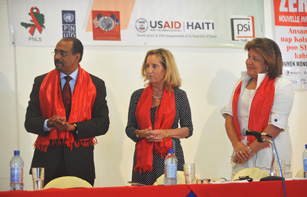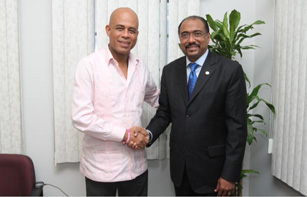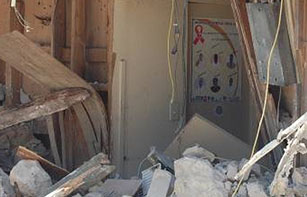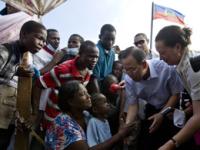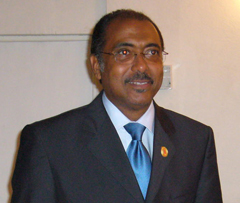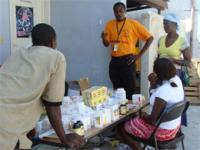
Functioning ARV dispensing site in Port-au-Prince after the devastating 12 of January earthquake.
Credit: UNAIDS
As Haiti begins to rebuild after the destruction left by the 7.0 magnitude earthquake that struck 10 miles outside Port-au-Prince on 12 January, first reports are coming in on the impact the tremble has had on Haiti’s AIDS response.
Haiti is the country with the most severe HIV epidemic among the Caribbean states–home to half of all people living with HIV in the region. Before the quake, there were an estimated 120 000 people living with HIV in the country with an estimated 6 800 children under the age of 15 also carrying the virus.
Data is starting to emerge on people living with HIV who have been affected by the quake and on critical infrastructure needed to provide essential services. An initial report estimates that out of 120 000 people living with HIV just under 70 000 live in affected areas. Prior to the quake, around 19 000 people were estimated to be on Anti-Retroviral Treatment (ART).
The world has a real opportunity to rebuild Haiti better, we must sustain the outpour of support now and tomorrow.
Michel Sidibé UNAIDS Executive Director
“The world has a real opportunity to rebuild Haiti better, we must sustain the outpour of support now and tomorrow,” Mr Michel Sidibé UNAIDS Executive Director said when speaking of the pledges made by the international community.
The UNAIDS country team and cosponsors are working with the government of Haiti and partners such as PEPFAR and Global Fund to Fight HIV, TB and Malaria as well as non-governmental organisations to gather information to asses the impact of the quake on clinics, lab equipment and as well as human resources. It is now critical that HIV prevention, treatment care and support services are resumed in affected areas.
The UNAIDS country team met staff working in Haiti’s oldest ART centre GHESKIO. The organization provides treatment for 6000 people of whom 80% have now been accounted for.
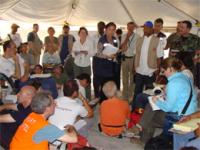
UN Health Cluster coordination meeting in Port-au-Prince
Credit: UNAIDS
While the clinic has suffered some damage to its structure, essential equipment and tragically also suffered human losses, staff at GHESKIO reported that they have enough stock of anti-retrovirals to cover the immediate need.
Other centres were not as fortunate. The UNAIDS country team visited the Hospital de la Paix which provides prevention of mother-to-child transmission services in Port-au-Prince. Here staff reported destruction of stock as well as lack of financial abilities to buy breast milk substitute necessary to prevent transmission from mother to child through the breast milk. Services at the clinic were only resumed 12 days after the quake.
Members of the UN country team on AIDS will visit five major PMTCT centres in the coming days to establish if similar damages are found.
We are seeing real suffering. It is in moments like this where those most at risk are forgotten. We must ensure that the marginalized members of our communities have access to HIV prevention, treatment, care and support services.
Michel Sidibé UNAIDS Executive Director
An initial situational analysis indicate immediate short term needs include limiting treatment interruption, provide nutritional support of people on treatment, and make sure PMTCT services are resumed. Networks of people living with HIV report that they urgently need food and water, tents, and hygiene kit in meeting with the UNAIDS country team.
In Haiti heterosexual transmission, often tied to sex work, is the primary source of HIV transmission although emerging evidence indicated that substantial transmission is also occurring among men who have sex with men. A challenge will be to ensure that key prevention commodities are made available to the displaced populations in and around Port-au-Prince.
“We are seeing real suffering. It is in moments like this where those most at risk are forgotten. We must ensure that the marginalized members of our communities have access to HIV prevention, treatment, care and support services,” Mr Sidibé said, promising that UNAIDS would be part of the global effort to support Haiti to build a better tomorrow.
UNAIDS is committed to working with the Haitian government and other development partners such as Global Fund and PEPFAR to look at how Haiti’s AIDS response can be strengthened over the long-term.
Support is needed to re-establish the AIDS-infrastructure as well as strengthening civil society, ensuring special attention towards HIV prevention, treatment, care and support services to populations at higher risk and put in place on coordinating authority to ensure no gaps or overlaps in the national response.




